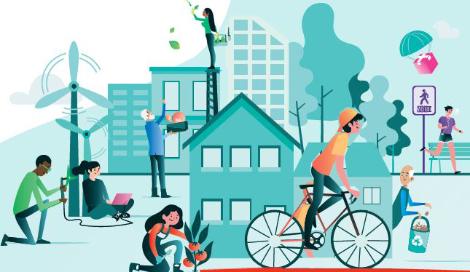Tomorrow my territory 04 Saving energy in my territory
Energy savings
November 2019
Agence pour l’Environnement et la Maîtrise de l’Energie (ADEME)
The 20 factsheets in the collection « demain MON TERRITOIRE » have been designed to give candidates and elected officials practical keys to take action, to open up the field of possibilities based on the experiences of other elected officials, from small towns to conurbations, large urban areas or sparsely populated areas. In the four corners of France, both in metropolitan France and in the French Overseas Territories, many of them are taking action, together with the players in their territories, to prepare for the future by taking action to mitigate climate change and adapt to its effects. With its knowledge and presence throughout the country, ADEME supports them with its tools, activities and financial aid.

Why is it important to reduce the energy consumed in my territory?
Town halls, schools, sports centres… all public buildings are big energy consumers. Heating and hot water in buildings are by far the main sources of consumption in the area. Lighting, too, if it is outdated, is a very energy-intensive item. All this represents a significant cost for the municipalities. And this also contributes to global warming through greenhouse gas emissions. Local authorities must take action to control the energy consumption of their assets. To reduce their energy bills. To act in favour of the climate. And to show the way to citizens and economic players who must also be mobilized to make the ecological transition a success.
How do you do it?
-
We act on both the equipment and the practices of the users, because only this combination is a guarantee of success.
-
A monitoring of consumption on the territory’s heritage is set up, encouraging more rigorous management. This initiative alone can lead to a 10% reduction in expenditure, without investing in the energy performance of buildings. You get help from a departmental energy syndicate, a local energy and climate agency or a shared energy advisor. To go further, an energy audit is carried out to identify other possible initiatives.
-
Without questioning the safety of people, street lighting is being converted to sobriety. It is reduced during off-peak hours. LEDs are used for Christmas lighting. We are enforcing regulations on the extinction of shop windows and illuminated advertising. In public buildings, lights are turned off at closing time.
-
Staff participation is an essential asset: their mobilization, their ideas, their experiments… are all guarantees of collective ownership and success. Staff are made aware of good practices for the economical use of IT tools: setting up computer standby mode, turning off devices at night, managing e-mail - by cleaning up e-mail, eliminating unnecessary attachments or recipients. We also limit the use of audiovisual equipment, in reception areas or cafeterias.
-
A strategy to renovate its buildings is launched, with an action plan focusing on energy efficiency as a priority. Insulation, improved heating control, and the introduction of an energy performance contract are all tools that help achieve this objective. Maintenance of heating systems is being stepped up beyond the mandatory five-year inspection, in order to quickly identify malfunctions that are synonymous with waste.
-
An energy performance criterion is introduced in the specifications for public contracts. The aim is to set an example in construction programmes, the rental of premises, the renovation of buildings, heating services, the renewal of vehicles or office equipment. And of course, in the case of new investments or building renovation, energy performance is put at the heart of the project!
Sources
To go further
Cit’ergie
Cit’ergie is a management and labelling programme that rewards local authorities for the implementation of an ambitious climate-air-energy policy.